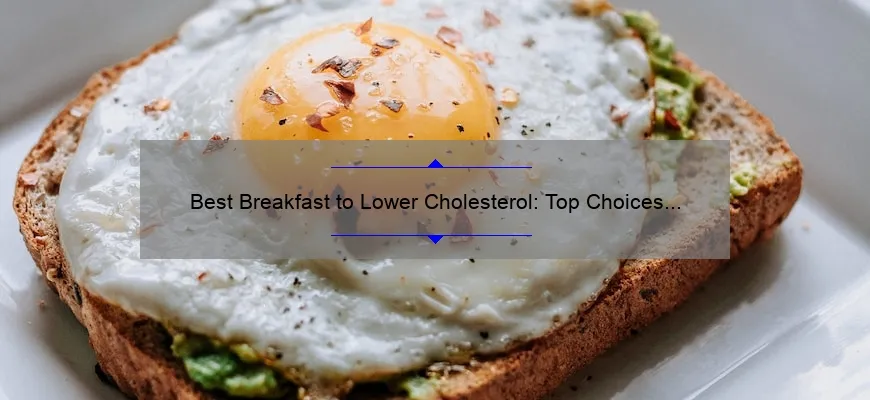Short answer best breakfast to lower cholesterol:
A heart-healthy breakfast to lower cholesterol includes foods rich in soluble fiber, such as oatmeal, flaxseed, and fresh fruits. Adding almonds, walnuts, or avocado can provide healthy fats while avoiding high-sodium processed meats is recommended.
Understanding the Importance of a Best Breakfast to Lower Cholesterol
A healthy and balanced breakfast plays a crucial role in maintaining overall well-being, including managing cholesterol levels effectively. Many experts agree that breakfast is indeed the most important meal of the day. But what makes it so essential? In this blog post, we will dive into the significance of having the best breakfast to lower cholesterol and why it should not be skipped or underestimated.
First and foremost, let’s dig into what exactly cholesterol is and its impact on our health. Cholesterol is a waxy substance found in certain foods and produced by our body’s liver. While our body needs some cholesterol for vital functions such as hormone production and cell building, too much of it can lead to serious health issues.
High levels of LDL cholesterol (commonly known as “bad” cholesterol) in our blood can increase the risk of heart disease and stroke significantly. On the other hand, HDL cholesterol (often referred to as “good” cholesterol) helps remove LDL from our bloodstream, reducing artery blockages. Maintaining a healthy balance between these two types of cholesterol is key to promoting heart health.
Now that we understand the implications of high cholesterol, let’s explore how an optimal breakfast can assist in lowering these levels effectively.
1. Fiber Power:
Including high-fiber foods in your morning meal can work wonders for managing your cholesterol levels. Foods such as whole grains, fruits, vegetables, nuts, and seeds are rich in soluble fiber – a type of fiber that binds with bad cholesterol in your gut and eliminates it through excretion instead of allowing it to be absorbed into your bloodstream. These incredible fiber heroes also keep you fuller for longer!
2. The Magic of Omega-3s:
Omega-3 fatty acids are renowned for their ability to help reduce inflammation throughout the body while bolstering heart health. Including foods rich in omega-3s like fish (think salmon!), flaxseeds, chia seeds, or walnuts provides a double punch to cholesterol by both reducing LDL levels and increasing HDL levels.
3. Protein Picks:
Incorporating lean protein options into your breakfast can aid in managing cholesterol effectively. High-quality protein sources like Greek yogurt, eggs, or legumes not only keep you satiated but also help stabilize blood sugar levels and encourage the production of HDL cholesterol.
4. Antioxidant Allies:
A substantial breakfast that includes antioxidant-rich foods like berries, dark chocolate (yes, you read it right!), or green tea can substantially contribute to promoting heart health. These antioxidants combat oxidative stress and protect against LDL oxidation – one of the main contributors to arterial plaque build-up.
5. Balanced Approach:
Finding the optimal balance between macronutrients is crucial for managing cholesterol levels efficiently. A balanced breakfast that incorporates a mix of carbohydrates, proteins, and healthy fats ensures sustained energy throughout the day while supporting heart health. Think of combining oats with Greek yogurt and a sprinkle of nuts; this will provide a winning combination for lowering bad cholesterol while boosting good cholesterol!
So remember, skipping breakfast is simply not an option when it comes to maintaining healthy cholesterol levels. By embracing a delicious morning feast packed with fiber-rich foods, omega-3 powerhouses, lean proteins, antioxidant allies, and maintaining the perfect macronutrient balance – you’re setting yourself up for success in combating bad cholesterol effectively.
And let’s not forget about enjoying the process! Experiment with different recipes, flavors, and textures to make your breakfast experience exciting every day. Get creative with overnight oats topped with fresh fruits or whip up a vegetable-packed omelet loaded with flavorful herbs – ensuring that your taste buds have as much fun as your body does in this heart-healthy journey!
So there you have it – an in-depth understanding of why having the best breakfast plays a vital role in lowering cholesterol levels. It’s time to rise and shine each morning by treating yourself to a delicious and nutritious breakfast that fuels your body while keeping your heart happy. Lowering cholesterol has never been so delightful!
Top Foods to Include in Your Best Breakfast to Lower Cholesterol
Lowering cholesterol can be a daunting task, but starting your day with the right breakfast foods can make a significant difference. By carefully selecting the ingredients and combinations of nutrients, you can create a delicious morning meal that will help keep your cholesterol levels in check. In this article, we will explore the top foods to include in your best breakfast to lower cholesterol.
1. Oats and Barley: These fiber-rich grains are excellent choices for a cholesterol-lowering breakfast. Both oats and barley contain soluble fiber, which helps reduce LDL cholesterol (the bad kind) levels. You can enjoy them as oatmeal or add them to smoothies or granola for a wholesome start to your day.
2. Nuts: Walnuts, almonds, and pistachios are packed with heart-healthy fats called monounsaturated fats. These fats have been shown to lower LDL cholesterol when consumed regularly. Sprinkle some crushed nuts on top of your oatmeal or yogurt for added crunch and flavor.
3. Avocado: Another fantastic source of heart-healthy fats is avocado. This creamy fruit contains monounsaturated fats that aid in lowering LDL cholesterol levels while promoting higher HDL (the good kind) cholesterol levels. Spread some mashed avocado on whole-grain toast for a nutritious and satisfying breakfast.
4. Berries: Blueberries, strawberries, raspberries – these sweet treats not only add vibrant color but also provide antioxidants that help protect against high cholesterol levels. Mix them into your yogurt or blend them into a refreshing smoothie for an extra burst of flavor.
5. Fatty Fish: Salmon and trout are rich in omega-3 fatty acids, which play a crucial role in reducing inflammation and improving overall heart health. Including grilled or smoked fish as part of your breakfast can be both delicious and beneficial for lowering cholesterol.
6. Greek Yogurt: Creamy and tangy Greek yogurt is not only high in protein but also contains probiotics that promote a healthy gut. Opt for the plain variety and add your own toppings like berries, nuts, or a drizzle of honey for sweetness.
7. Whole Grains: Whether it’s whole-grain bread, muffins, or cereals, incorporating these fiber-rich options into your breakfast can have a significant impact on cholesterol levels. They help lower LDL cholesterol while providing essential nutrients and sustaining energy throughout the morning.
8. Green Tea: Adding green tea to your breakfast routine is another clever way to reduce cholesterol levels. It contains antioxidants called catechins that are known to improve heart health and lower LDL cholesterol levels. Sip on a cup of warm green tea alongside your breakfast for an added health boost.
It’s crucial to remember that maintaining healthy eating habits extends beyond just one meal or food group. For optimal results in lowering cholesterol, combine these top foods with regular physical activity and a balanced diet overall. Monitoring portion sizes and avoiding excessive intake of saturated fats and trans fats will also contribute greatly to improving heart health.
So let these top foods be the foundation of your best cholesterol-lowering breakfast – nourishing yourself while delighting in flavorsome combinations will set you up for a healthy day ahead!
Exploring the Step-by-Step Guide for Creating the Perfect Best Breakfast to Lower Cholesterol
Exploring the Step-by-Step Guide for Creating the Perfect Best Breakfast to Lower Cholesterol
Breakfast is often considered the most important meal of the day, and it becomes even more crucial when you’re trying to lower your cholesterol levels. But what exactly should you include in your breakfast to ensure you kick-start your day on a healthy note? Look no further! In this blog post, we will delve into a step-by-step guide for creating the perfect best breakfast to lower cholesterol, helping you make informed choices that are both delicious and nourishing.
Step 1: Prioritize High-Fiber Foods
When aiming to reduce cholesterol levels, incorporating high-fiber foods into your breakfast routine is essential. Fiber helps bind cholesterol in your digestive system, preventing it from being absorbed into your bloodstream. Opt for whole grains like oatmeal or whole wheat bread, which are excellent sources of soluble fiber. Starting off with a bowl of warm oatmeal topped with fresh berries sets an incredibly satisfying foundation for the day ahead.
Step 2: Embrace Omega-3 Fatty Acids
Omega-3 fatty acids are known for their heart-healthy benefits and can greatly impact your efforts in lowering cholesterol. Incorporating them into your breakfast arsenal not only adds flavor and depth but also promotes good health. Consider including fatty fish such as salmon or mackerel, which provide ample amounts of omega-3s as well as protein to keep you feeling full until lunchtime. A smoked salmon omelet served with a side of steamed spinach not only tantalizes taste buds but also supports overall heart health.
Step 3: Power Up with Plant Sterols
Plant sterols are naturally occurring compounds found in plants that have been shown to effectively lower LDL (bad) cholesterol levels. They work by blocking cholesterol absorption in the intestine, reducing its circulation within our body systems. Including foods fortified with plant sterols in your breakfast options can boost your efforts towards cholesterol management. Look for orange juice or yogurt specifically labeled as being enriched with plant sterols – an easy way to give yourself a little extra health boost alongside your morning meal.
Step 4: Load Up on Antioxidant-Rich Fruits and Vegetables
Amping up your breakfast with antioxidant-rich fruits and vegetables not only adds vibrant colors to your plate but also provides a wide array of health benefits. Blueberries, tomatoes, avocados, and leafy greens are known for their high antioxidant content and can positively impact cholesterol levels. Incorporate these nutrient powerhouses into your breakfast routine through homemade smoothies or a fresh vegetable omelet packed with colorful bell peppers and tender spinach leaves.
Step 5: Opt for Healthier Cooking Methods
While the ingredients you choose play a significant role in lowering cholesterol, it’s vital to pay attention to the cooking methods employed as well. To keep your breakfast on the healthier side, avoid excessive oil, butter, or heavy cream usage. Instead, consider grilling or baking your proteins like fish or tofu while lightly steaming vegetables to retain their nutrients. These cooking techniques can help reduce unnecessary fat intake while still delivering delicious flavors to kickstart your day.
Crafting the perfect best breakfast to lower cholesterol involves balancing nutritional needs without compromising on taste or enjoyment. By following this step-by-step guide, you’ll not only discover creative ways to tackle high cholesterol levels but also embark on a delicious adventure every morning. So why wait? Start exploring these fantastic recipes and make each breakfast a delightful experience that contributes towards achieving optimal heart health!
Answering Frequently Asked Questions about the Best Breakfast to Lower Cholesterol
Are you tired of dealing with high cholesterol levels? Well, fret no more! We have gathered the most frequently asked questions about the best breakfast to lower cholesterol and are here to provide you with detailed professional answers. So, put on your reading glasses and get ready for a witty and clever explanation that will surely satisfy your curiosity!
FAQ #1: What makes a breakfast great for lowering cholesterol?
To kick-start our discussion, let’s begin with understanding what constitutes an ideal cholesterol-lowering breakfast. A great breakfast for tackling cholesterol should contain ingredients that are heart-healthy and beneficial for reducing LDL (low-density lipoprotein) or “bad” cholesterol levels. These ingredients include whole grains, fruits rich in fiber such as apples and berries, healthy fats like avocados or nuts, and foods fortified with plant stanols or sterols known to inhibit cholesterol absorption.
FAQ #2: Should I focus on specific types of grains when choosing my breakfast?
Absolutely! When it comes to lowering cholesterol through breakfast choices, opting for whole grains is crucial. Whole grains are packed with fiber, vitamins, minerals, and antioxidants that work together in combating bad cholesterol effectively. Oatmeal is an excellent example of a whole grain powerhouse due to its high soluble fiber content which helps reduce LDL levels remarkably. Don’t limit yourself – explore other options such as quinoa or whole wheat bread as well!
FAQ #3: What about eggs? Are they good or bad for lowering cholesterol?
Ah yes, the age-old egg debate! Eggs have long been unfairly blamed for their potential impact on increasing blood cholesterol levels. The truth is: eggs can actually be part of a heart-healthy breakfast if consumed moderately. While egg yolks do contain dietary cholesterol, research suggests that they have a minimal effect on raising blood cholesterol compared to saturated and trans fats found in processed foods or meats cooked in unhealthy oils.
FAQ #4: Can I incorporate fruits into my breakfast to lower cholesterol?
Definitely! Fruits are not only a delightful addition to any breakfast but also serve as natural cholesterol fighters. Packed with soluble fiber, specific fruits like apples, berries, and citrus fruits actively help in lowering LDL levels. Additionally, their abundance of antioxidants aids in preventing the oxidation of LDL particles, reducing the risk of heart diseases. So go ahead – grab that juicy orange or mix some blueberries into your yogurt for an extra heart-healthy punch!
FAQ #5: Is it essential to include healthy fats in my breakfast routine?
Absolutely! Contrary to popular belief, not all fats are created equal. Incorporating healthy fats into your breakfast can have a significant impact on lowering cholesterol levels over time. Avocado is a wonderful source of monounsaturated fat known for its heart benefits. Nuts (like almonds or walnuts) packed with omega-3 fatty acids can also aid in reducing LDL levels when consumed appropriately.
FAQ #6: Do foods fortified with plant stanols or sterols really make a difference?
Indeed they do! Foods fortified with plant stanols or sterols play a vital role in significantly lowering LDL cholesterol levels. These naturally occurring compounds found in plants work by blocking the absorption of dietary cholesterol into your bloodstream. Look out for products such as certain margarines, orange juice, and cereal bars specifically designed to contain these fabulous phytosterols.
Now armed with these professional answers full of wit and clever explanations about the best breakfast choices to lower cholesterol, you’re ready to embark on a journey towards better heart health and overall well-being. So go ahead and tailor your morning meals wisely – your body will thank you for it!
The Science behind How a Best Breakfast Can Help You Achieve Low Cholesterol Levels
Breakfast has long been hailed as the most important meal of the day, and for good reason. Not only does it provide us with the much-needed energy to kickstart our day, but recent studies have also shown that a well-planned breakfast can play a crucial role in helping us achieve low cholesterol levels. But what is the science behind this connection? Let’s delve into it.
Firstly, let’s understand what cholesterol actually is. Cholesterol is a waxy substance found in our blood that serves several vital functions like forming cell membranes and producing hormones. However, when there is an excess amount of cholesterol in our bloodstream, it can lead to serious health issues such as heart disease and stroke.
Now, you might be wondering how breakfast comes into play here. Well, when we wake up in the morning after fasting through the night, our body’s metabolism is at its lowest point. Eating a healthy breakfast rich in soluble fiber has been proven to help lower cholesterol levels by reducing the absorption of dietary cholesterol into our bloodstream.
One common example of soluble fiber that can work wonders for your cholesterol levels is oatmeal. Oats are packed with beta-glucan, a type of soluble fiber that forms a gel-like substance in your digestive system. This substance binds to bile acids – which are made from cholesterol – preventing their reabsorption back into the bloodstream and prompting your liver to use more cholesterol from your body to produce new bile acids. As a result, this process effectively lowers total cholesterol levels.
Adding protein-rich foods like eggs or Greek yogurt to your breakfast can also play a significant role in managing your cholesterol levels. Studies have indicated that increasing protein intake helps elevate HDL (good) cholesterol while decreasing LDL (bad) cholesterol levels.
Furthermore, integrating foods high in omega-3 fatty acids – such as salmon or chia seeds – into your breakfast routine can contribute immensely towards lowering LDL (bad) cholesterol and triglyceride levels. Omega-3 fatty acids have been shown to reduce inflammation and improve overall heart health.
The timing of your breakfast also matters when it comes to cholesterol management. Eating breakfast within one to two hours after waking up can help regulate the body’s insulin response, thereby promoting healthy cholesterol metabolism.
In addition to these food choices, it is equally essential to avoid processed and high-sugar breakfast options that may potentially contribute to higher LDL cholesterol levels. Opting for whole foods like fresh fruits, vegetables, and whole grains can ensure that your breakfast supports your overall heart health.
To sum it up, a well-planned breakfast can serve as a powerful tool in achieving low cholesterol levels by utilizing the science behind soluble fiber absorption, protein metabolism, omega-3 fatty acid benefits, and proper timing. So next time you’re preparing your morning meal, don’t forget to optimize it for optimal cholesterol management – your heart will thank you!
Delicious and Nutritious Recipes for Your Best Breakfast to Lower Cholesterol
Are you tired of boring and tasteless breakfast options that do little to address your cholesterol levels? Look no further! We have gathered a collection of delicious and nutritious recipes that will not only kickstart your day but also help lower your cholesterol.
Breakfast is often considered the most important meal of the day, so why settle for less when it comes to taking care of your health? These recipes are designed to be both satisfying for your taste buds and beneficial for your body. Let’s dive in and explore these mouthwatering options together.
First on our list is a classic: Spinach and Feta Omelette. This protein-packed dish combines the goodness of spinach with the tangy flavor of feta cheese. Packed with vitamins and minerals, spinach helps reduce cholesterol levels while adding a vibrant green hue to your plate. The creamy feta cheese complements the earthiness of spinach, creating a perfect harmony of flavors in every bite.
If eggs aren’t quite your thing, fear not! Our next recipe will surely tickle your fancy: Avocado Toast with Smoked Salmon. Not only is this dish visually appealing, but it’s also packed with healthy fats that can help lower LDL (bad) cholesterol levels. The creaminess of avocado combined with the smoky richness of salmon creates an irresistible combination that will leave you craving more.
For those who prefer something sweet in the morning, we haven’t forgotten about you! Our third recipe highlights the natural sweetness and fiber-rich qualities of oats: Berry Overnight Oats. This make-ahead option saves you time in the morning without compromising on flavor or nutritional value. Mixed with antioxidant-rich berries, this delightful breakfast bowl provides a heapful of heart-healthy benefits while satisfying any sweet tooth.
But what if you’re really pressed for time? Don’t worry; we’ve got you covered! Introducing our final recipe: Green Smoothie Bowl. Packed with nutrient-dense leafy greens, this powerhouse of a breakfast is a quick and refreshing way to start your day. The combination of spinach, kale, and other green vegetables provides fiber and antioxidants that can help improve cholesterol levels. Topped with a variety of fruits and nuts for added texture, this bowl is an easy way to fuel your body while saving time.
As you can see, taking care of your health doesn’t mean sacrificing taste or indulgence. These breakfast recipes are created with the perfect balance between flavor, nutrition, and reducing cholesterol levels. By incorporating these delicious options into your routine, you can have the best breakfast ever while actively working towards improving your overall well-being.
So why wait? Start cooking up these delectable dishes and savor the goodness in every bite. Lowering your cholesterol has never tasted so good!






